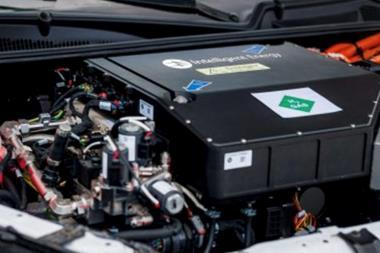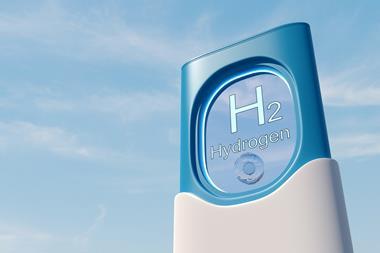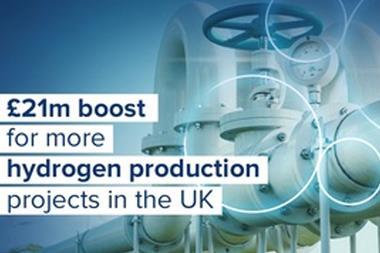Over one and a half million hydrogen powered vehicles could be on UK roads by 2030 according to a joint Government-industry study published this week.
The forecast is made in an interim report commissioned to evaluate the benefits of hydrogen fuel cell electric vehicles (FCEVs) and ensure the UK is well positioned for their commercial roll-out.
Produced by the UKH2Mobility project - which brings together leading businesses from the automotive, energy, infrastructure and retail sectors with Government - the study provides a ‘roadmap’ for the introduction of vehicles and hydrogen refuelling infrastructure in the UK.
Business Minister Michael Fallon said: "The transition to ultra-low emission vehicles has already begun. It has the potential to create really significant new economic opportunities for the UK, to diversify national energy supply and to decarbonise road transport. The findings released today demonstrate that hydrogen fuel cell electric vehicles can make a significant contribution to this.
"Successful commercialisation of the technology will require Government to work in true partnership with industry. Our international rivals are looking to steal a march in this area and so UKH2Mobility recognises the importance of prompt action to ensure the potential benefits are realised by businesses and consumers in the UK.
"We already have a strong automotive sector and must ensure it stays that way. Opportunities for the UK to take a leading role in low carbon technologies will be looked at as part of our auto industrial strategy, published later this year".
The key findings are:
• Consumer - up to 10 per cent of new car customers will be receptive to fuel cell vehicles when first introduced, attracted by the newness of the technology and environmental considerations. ’Early adopter’ interest will need to be fostered and converted into sales to build confidence in and support for FCEVs, as the first models become available in world markets within the next three years.
• Vehicles - initial uptake of FCEVs will progress as models make their way on to the market and the fuelling network matures. The roadmap shows that once mass FCEV production is established, bringing costs down, there is the potential for 1.6 million vehicles on UK roads by 2030, with annual sales of more than 300,000.
• Infrastructure - a co-ordinated network of hydrogen refuelling stations will need to be established, focusing at first on national trunk routes and heavily populated areas. An initial rollout of 65 stations would provide sufficient coverage in line with early vehicle sales, with the network growing in line with the number of FCEVs on the road to provide 1,150 sites by 2030.
• Environment - the roadmap shows that, based on the uptake figures above, FCEVs could reduce UK annual total vehicle CO2emissions by three million tonnes in 2030. Replacing diesel vehicles with FCEVs could also save between £100 million and £200 million a year in the cost of damage to air quality caused by vehicle emissions by 2050.
• Fuel production - FCEVs produce no harmful tailpipe emissions, but some forms of hydrogen production do generate CO2. Using a range of manufacturing methods can deliver hydrogen at a cost that is competitive with diesel, with 60 per cent lower CO2 emissions in 2020, improving to 75 per cent less in 2030. Hydrogen production will be on course for zero emissions by 2050, at which time FCEVs could have a market share of between 30 to 50 per cent.
• Investment - a basic initial network of Hydrogen Refuelling Stations is required to encourage early adoption of FCEVs and there will inevitably be a lag between the creation of this network and there being sufficient FCEVs on the road to make it financially self-sustaining. Phase 1 of the project estimated the total finance needed to be around £400m to 2030. Phase 2 will be focussed on both reducing this figure and considering different models for delivering it.
The final report of Phase 1 is due to be published in March. Phase 2 of UKH2Mobility will then use the information and roadmap produced in Phase 1 to develop a detailed business case and specific actions for participants to commit to.
Akihito Tanke, Vice President, Research and Development, Toyota Motor Europe said: "The motor industry recognises it is vital for it to develop and deliver new solutions for reducing the environmental impact of the vehicles it produces. Hydrogen fuel cell technology represents a major advance in securing sustainable mobility. As manufacturers reach the point of bringing the first FCEVs to market, it is important that all interested parties work together to ensure their benefits can be appreciated and realised through co-ordinated dialogue between industry partners and government bodies. UKH2Mobility’s Phase 1 findings provide valuable resources and intelligence to help us secure these advantages and we look forward to participating in Phase 2 to further confirm the potential of hydrogen as a low carbon fuel in the UK."
Dr Graham Cooley CEO, ITM Power, a hydrogen energy storage and clean fuel partner in UKH2Mobility, said: "We are pleased with the findings of Phase 1 of UKH2Mobility, which reflect a diligent process of appraisal by the collaborative partnership. Phase 1 sows a seed for the adoption and development of a new transport system which will allow society to decarbonise road transport and clean up emissions, without disrupting its business and social routine. Phase 2 will show how that seed can proliferate, enabling the UK to be a world leader in the deployment and manufacturing of the necessary electrolyser-refuelling technology and fuel cell vehicles. This presents the UK with a very real economic opportunity for growth."
James Batchelor, Managing Director - Motive, Intelligent Energy, said: "The extensive work carried out by the UKH2Mobility consortium positions the UK as a lead market for the roll-out of fuel cell electric vehicles, directly contributing to national decarbonisation and air quality improvement objectives. The programme is particularly relevant for UK companies such as Intelligent Energy in building on our leading fuel cell expertise, developing our local supply chains and in creating additional opportunities for our products. We look forward to progressing to the next phase."
Pierre-Etienne Franc, Director, Air Liquide Technologies of the Future said: "The UKH2Mobility initiative has succeeded in gathering both leading industry companies and government bodies in a coordinated approach to study the conditions and paths to allow FCEVs to reach their full potential in the UK.
"The work achieved in Phase 1 provided fact-based elements and rationale which confirm that the UK could be a country at the forefront of early FCEVs deployment.
"Through this participation, Air Liquide is proud to pursue its commitment in the development of hydrogen energy infrastructure in the UK and worldwide, and to help develop zero emissions transport solutions."






























No comments yet